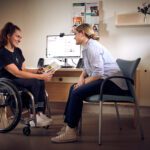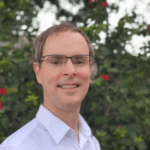At his core, Curtin transgender psychology student Logan Ward, a recently elected 2016 queer officer in the Curtin Student Guild’s Queer Department, wants to help others. His new role will allow him more opportunities to counsel and educate LGBTI students about mental and sexual health issues. Whatever the future holds, it’s heart-warming to see that it will in some way involve Logan flying the rainbow flag for the LGBTI community in Perth.
Why did you choose to study psychology at Curtin?
It was an impulse decision. I thought I was going to do art. But at that time, a lot of friends were thinking about a lot of hard stuff – self-harm, bulimia, suicide – and they didn’t seem to be talking to anyone about it. It was quite heavy. I also had my fair share of experiences with psychologists who were really condescending and rude.
I’d heard about all the universities, so I knew about Curtin, but I have one queer cousin in Melbourne who said they heard Curtin was great in terms of diversity. I wasn’t ‘out’ in terms of my gender, but I’ve always been queer in terms of my sexuality, and she said, “Go there. It will be great to get that sense of community.” For whatever reason, Curtin felt right. It was great coming to Open Day and asking the lecturers at the time about the psychology course. Afterwards, there was one time in high school where we had two master of psychology students come in and I asked them their thoughts on doing psychology at Curtin and they said, “You’ve got to get through the theory in the general foundation units, just like any course, but after that it’s fantastic and it’s a really good experience.”
So, at the last minute, I decided to go with psychology on a whim, but it’s been absolutely amazing. I’m really glad I stuck it out. I’m now in my final year, final semester of a four-year bachelor of psychology. I handed in my dissertation last week, so I’m kind of excited. I also find out soon if I can get an interview after applying for a Master of Counselling Psychology. There have been units that are hard and stressful, but overall I would highly recommend doing psychology at Curtin.
What was the coming out process like for you?
I was questioning my gender for a year. I didn’t know there were genders beyond male and female up until university and it just blew my mind, because I went to an all-girls Catholic school, so I learnt none of that. I was shocked. I went to the queer officer at Curtin and said, “Can I talk to someone about this?” They linked me to somebody in the counselling office, who was the first psychologist I talked to that wasn’t terrible. I actually included her in my dissertation and showed it to her recently, and she had tears and said she was going to cry.
Having a safe space to learn about gender helped. I came out to my partner at the time. He was fantastic. I slowly came out to friends. Some took it amazingly. Others took a while to warm up. They asked, “Is it a phase? I don’t know what’s happening”, and it took a lot of convincing for me to say, “No, no, no. This is not a phase.” Some of them have now said they’ve felt guilty for dragging their feet, but I told them not to worry and said I would have done the same thing if I was in their position.
I was really nervous about coming out to my family. My mum is a conservative, middle-class Burmese woman, so I thought that wouldn’t go down well. I thought that my dad, who was the more rational of my parents, would have taken it a bit better, but he actually didn’t. I told my uncle first: he was super chill and he didn’t mind. We have a big extended family, particularly on mum’s side, and he pointed out the cousins that I should tell first because they would be okay with it and the ones I should tell later.
Telling my uncle went really well, so I thought I’d come out to my dad, but that did not go well. He got a big shock and thought it was messed up. It really affected my self-confidence because he said, “You can’t have surgery because that’s self mutilation”, which I was very uncomfortable about hearing. He actually outed me to my mum right before exams, which was bad. I had to leave home for a couple of days and I stressed out. I had never done poorly – I had never failed an exam – so I really freaked out.
It was 11 o’clock at night and I called up a friend, asking for help. He got in contact with a bunch of other people who got in contact with more people, until it went back to [the Curtin Student Guild’s] queer officer at the time, Kat, who told me that she had spent the last hour calling a bunch of crisis centres and they were no help, so she was going to pick me up. I said she didn’t have to do that, but she drove to my house, which was out of her way and drove me to my partner’s place at the time. Kat was one of the best people that I’ve ever met. She had a high burn out rate compared to most other queer officers, because most people take it for a year and then can’t keep going anymore, but she kept doing it. Good mates then took me in for a couple of days each, but I was stressed out and uncomfortable.
In comparison to others, my experience was relatively tame. I didn’t get physically assaulted or anything like that. I wasn’t homeless for a long period of time. I had food and money and clothes. But it was terrifying and I definitely don’t want anyone else to have that experience.
Has there been anything that you’ve done to help people, even though you’re not a queer officer yet?
Even though it’s not officially my job until in a couple of months, I’ve been helping people if they’ve been looking for a doctor or psychologist.
It was really flattering when I met this girl who was transitioning from male to female – she had been homeless for a long time and also had problems with substance abuse, as far as I could tell from small bits of information that she gave. She needed to see a doctor and I told her there was one on campus who wouldn’t ask invasive questions about her gender. She was nervous and I offered to go with her and help her book an appointment. I hadn’t seen her for several months and she came into the department and said, “If I didn’t talk to you, I probably wouldn’t be alive right now.” We hugged it out.
What will happen once you become the queer officer?
As a queer officer, you’re a representative to the queer collective at Curtin. The Queer Department is a safe space. We have an agreement that we don’t do drugs and that we check in with people if we talk about something triggering. It has been really sweet to see Facebook messages saying that I would be a really good queer officer.
It can be quite intense because you don’t know what’s going to happen and you’re literally confronted with sometimes the worse situations, where sometimes people will tell you personal things that might be above your own comfort level. You do a bit of counselling, not to a professional degree, but just asking people if they are safe and okay, and then sending people off to the right health professionals.
I want to continue to foster a safe space for people to ask questions they might be a bit embarrassed to ask. I know some people in the department might not have the education to deal with issues like mental health or sexual health and safety – there’s a stigma about mental health and it’s really prevalent in the queer community, which is shocking – so I’d like to be able to do some form of workshop or a mini-lecture. It might be like your generic mental health class back at high school, but I’d tailor it to be queer-specific, have interesting activities and offer free food. I’d still like to have all the fun events, like Queers on the Lawn or movie nights, but the workshops would be events where people would learn about a topic that they wouldn’t necessarily feel comfortable talking about it to their parents, but could talk about it to a guest speaker.
I don’t know where I’d be if I didn’t go to the Queer Department when I started, because I was so nervous about going anywhere on campus. It was a great place to connect with people who were more or less in the same boat as me.
What’s your dream job?
I’ve done a couple of volunteering gigs with LGBTI groups and I’ve got a general view of the resources spread across Australia. Basically what we have here in Perth isn’t really good enough. It’s very heartbreaking. So I want to be a gender and sexuality diverse peer counsellor. I could talk to people and say I’m aware of some of the issues they’re going through, even though, obviously, we’re all different.
Particularly this year, a lot of my friends who are trans have been homeless. They have gone to available crisis accommodations or homeless centres that have said, “We can’t put you with the women, because you’ll make them uncomfortable, and we can’t put you with the men, because they’ll beat you up.” It’s messed up. There’s not a lot of win out there, particularly since we’re a niche part of the queer community. It’s growing and things are improving, but I would just like to speed them up.



